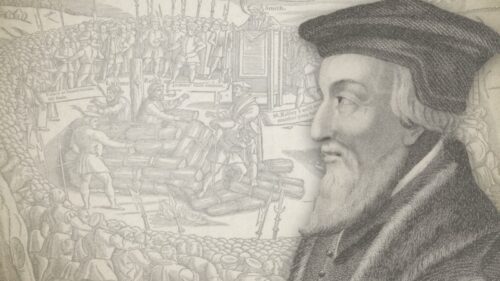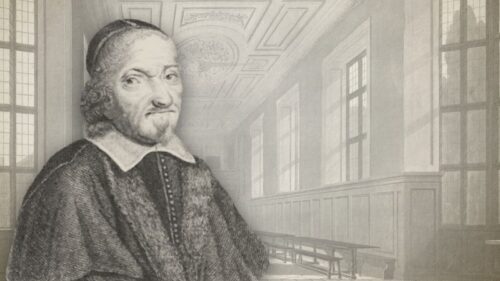George Ella
George M. Ella, born February 1939 in Yorkshire, England, has lived most of his life on the European Continent. He is a retired Senior Civil Servant formerly employed in teaching, post-graduate teacher-training, chairing examination boards and curricula work. He holds degrees from London, Hull, Uppsala, Essen, Duisburg and Marburg universities with doctorates in English Literature and Theology. Dr. Ella has written regularly since the seventies for a number of magazines and newspapers and published numerous books on Church History, including biographies of William Cowper, William Huntington, James Hervey, John Gill, Augustus Montague Toplady, Isaac McCoy and Henry Bullinger besides works on doctrine and education. He is currently finishing the third volume of his series 'Mountain Movers'; a biography of John Durie; a work on Law and Gospel and further study material for the Martin Bucer Seminar. Dr. Ella is still internationally active as a lecturer and is a Vice-President of the Protestant Reformation Society. He is keenly interested in missionary work and has written on the spread of the Gospel amongst the Same people of Lapland, the people of India and the Native Americans. This present volume follows Dr. Ella's 'The Covenant of Grace and Christian Baptism', also published by the Martin Bucer Seminar. George Ella is married to Erika Ella, nee Fleischman, a former government administrator, and they have two sons Mark (41), Director of a Polytechnic College in Bremerhaven and Robin (39), Leading Senior Physician in a newly-built Geriatric and Psychiatric clinic in Dessau.
George Ella on Doctrinal Matters
George Ella's Biographical Sketches
-
The Works of Andrew Fuller with a Biography (Part 2)
The Works of Andrew Fuller with a Biography by the Editor Andrew Gunten Fuller A Banner of Truth Trust Facsimile Reprint Part Two The bulk of BOT publications between the late nineteen-fifties and mid-eighties were a great support to the churches. Since then the BOT have lowered their standards to meet a wider readerships and have bowed to popular demands for less solid doctrines. Surprisingly, this broadening of views has led to the BOT adopting a narrow, intolerant, party spirit against those who refuse to take their lead. With their reprint of Andrew Fuller’s works, the BOT have now abandoned Reformation teaching altogether, giving their readers a philosophy of religion which appeals to the fallen human heart and mind. Fuller based his gospel on the…
-
The Works of Andrew Fuller with a Biography (Part 1)
The Works of Andrew Fuller with a Biography by the Editor Andrew Gunten Fuller A Banner of Truth Trust Facsimile Reprint Part One On the cover of the new BOT facsimile of Fuller’s works, we find the title and the name Michael A. G. Haykin. Prof. Haykin, however, neither edited the work nor provided the introductory biography. This was done by Andrew Fuller’s son, Andrew Gunten Fuller in 1831. Of Fuller Jr.’s efforts, Spurgeon said that he had used much moss to cover his father’s thorns. What then has Michel Haykin to do with this volume? Very little, apart from lending his name to the cover. True, Prof. Haykin has written a few opening words entitled Andrew Fuller: Life and Legacy A Brief Overview but…
-
Letter Defending William Huntington
Sir: It is understandable that one who identified himself so closely with the English Reformers, Whitfield and the Marrow Men should be criticised by Arminians. For Huntington, Arminians were Antinomians who rejected the condemning and convicting use of the law in evangelism, inviting sinners to approach God “as if they had never apostatized”. They believed that man was not totally fallen but was naturally able to make saving decisions. Huntington preached a full gospel whereas his Fullerite and Wesleyan critics taught respectively that the doctrines of grace were for believers only or to be rejected as ‘the religion of the Turks’. Contrary to adverse criticism that Huntington stood alone, he was supported by a relatively large number of Independent, Anglican and Baptist ministers. Huntington upheld…
-
Robert Oliver And The Twists And Turns Of Historical Revisionism
In July, 1988 an anonymous article appeared in the Banner of Truth magazine, surprising and shocking many readers. It was a fierce attack on the person and testimony of William Huntington, known affectionately as ‘the Immortal Coalheaver’. The article, which followed a similar attack on John Gill by Robert Oliver the previous year, was planned to start off what the BOT calls an ‘important controversy’ to warn readers against the traditional Calvinism of these men. In Huntington’s case (though Gill’s was not dissimilar) the BOT were faced with two difficulties. First, it was obvious that Huntington had the largest congregation in London during the latter part of the 18th century and was the most popular and most read Calvinistic preacher and evangelist of his day.…
-
Particular Redemption And The Free Offer
David H. J. Gay. Brachus 2008. Obtainable from Amazon Books. £10 per copy. Bulk prices available. No easy read. David Gay promises ‘no easy read’ in this supplement to his The Gospel Offer is Free: A Reply to George M. Ella’s The Free Offer and The Call of the Gospel. It is basically a collection of notes, quotes and sources in tiny print covering a hundred pages more than Gay’s initial work. ‘If this gets too involved’ Gay advises, “omit the copious footnotes”. But where is the main text to which they are all appended? It is scattered higgledy-piggledy throughout the notes. You might find half a sentence somewhere followed by eight pages of notes before two more sentences appear only to delve into pages…
-
Reflections On Some Recent Banner Of Truth Criticisms Regarding William Huntington And Avarice
The Banner critics portray Huntington as living like an Eastern Nabob in the lap of luxury. Providence Chapel paid their pastor a salary of £100 per annum at the beginning of his ministry but this was rapidly doubled. This was not an unusual amount. Rowland Hill, the only London pastor who could compete in numbers received half to a third more salary than Huntington. James Hervey (1714-1758) received £180 per year and also the profits from a farm which had been in the family for generations. In spite of his popularity, Hervey’s congregations was only half that of Huntington’s. Pastors in patronised livings, however, often received between £600 and £1,000 a year. Many Evangelical clergymen such as Moses Browne, Vicar of Olney when John Newton…




